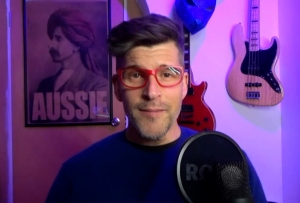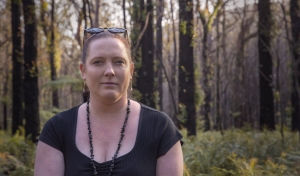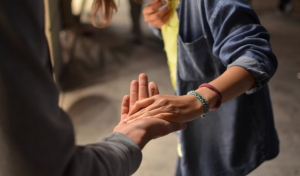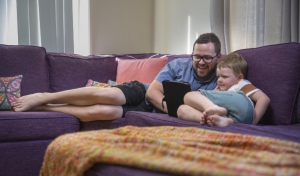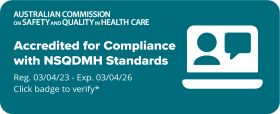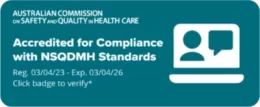Accessibility Tools
- Content scaling 100%
- Font size 100%
- Line height 100%
- Letter spacing 100%
Displaying items by tag: self care
Share the simple things that help your wellbeing this Mental Health Month
Welcome to Mental Health Month!
While any time is a good time to talk about mental health, having a dedicated awareness month helps remind us that we are not alone, help is available if needed, and there are many things we can do to stay on top of our mental health – now and all year round.
Time is right to prioritise mental health and well being
Media Release: 17 November 2020
As the one-year anniversary of the Black Summer bushfires approaches, SANE is encouraging New South Wales South Coast residents to focus on their mental wellbeing as part of their bushfire recovery, especially those with pre-existing mental health conditions, and has developed a new online resource called Life After Bushfires to help them do so.
Understanding trauma through disaster recovery
Quick Facts
Devastating natural disasters have had a profound traumatic effect on many Australians. Finding support can help as you work through trauma recovery.
- Disaster trauma is an understandable response to a devastating experience. You’ve lived through an extraordinary event, one that many people can’t begin to understand. The trauma doesn’t necessarily end once the events are over. You might still be living with their impact.
- Traumatic experiences are characterised by the distress they cause. They don’t even need to have happened to you – we can be traumatised by witnessing something happen to someone else1. And if you’re living with an existing mental health issues, you might feel even more distressed, or experience worsening symptoms2.
- Understanding how you’re feeling can help on your journey to recovery.
-
What can trauma after a disaster feel like?
Everyone responds differently. The effects of trauma might be obvious from the first day, or take months to reveal itself. All the ways you feel are valid.
It’s normal for feelings to fluctuate as you work through disaster recovery. Even day to day, you may have highs and lows. Mood swings, the sensation of reliving the experience and fear of the future are all common feelings after a disaster3.
-
Why does this feel so hard?
It is hard, and it’s healthy to acknowledge that! Trauma after a natural disaster is complex. It’s not only influenced by living through the events, but by their ongoing impact upon various aspects of your personal life and community.
You might have also been affected by:
- Displacement
Being evacuated or forced to live away after disaster can have a serious impact on mental health, especially if you’re still waiting to come home or won’t be able to return. - Loss
Natural disasters can cause devastating loss of life. Knowing someone who died or was seriously injured can compound the traumatic feelings, even if you didn’t know them well. - Uncertainty
Being unsure about the future can make it hard to feel safe and secure. When support is hard to find, it can reinforce traumatic feelings of being left behind or abandoned. - Insecurity
Whole livelihoods can disappear and take time to return. Financial precarity and job loss can have a serious long-term impact on mental health. - Wide-spread trauma
Unlike many traumatic events, natural disasters often affect whole communities of people. While you’re learning to cope with your own difficult feelings, you may also be responsible for or affected by the response of family members, friends, neighbours and colleagues.
- Displacement
-
How do I identify my triggers?
A ‘trigger’ is something that sparks a memory of the traumatic event that can lead to distressing sensations, emotions, thoughts, and further memories of the event. Triggers can be internal, like memories or physical sensations that remind you of the traumatic event, or they can be external, like returning to the place where it happened or approaching the anniversary date of the event .
Triggers can be hard to avoid, especially if you’re still living in an area that has been affected by a crisis or natural disaster. This can mean that the distress associated with your triggers are also hard to avoid. Sensations, thoughts, emotions and memories linked to the traumatic event can feel intrusive and unpredictable.
Identifying your unique triggers can help to prepare for the challenging experiences they bring up. Pick a time when you’re feeling calm and safe to create a list of your triggers. You might decide to this with the support of a trusted friend, family member or health professional, taking breaks if it becomes too upsetting. Consider, for example:
- What thoughts might you have?
- How do they feel in your body?
- Where do you feel unsafe?
- What emotions are you having?
Once you have an understanding of your triggers, the next step is to develop strategies that will help you prepare to better cope with the issues these triggers might raise for you in the moment.
-
How can I manage my trigger responses?
Managing the distress caused by triggers takes practice, so it can help to create a clear plan before you need it. Start with an affirmation about how you will cope. For example, “I will try to sit with this feeling, knowing that even though it is uncomfortable, it will pass.”
When you feel the distress rising:
- recognise the emotion or physical sensation
- allow yourself to feel the sensation, remembering your plan
- use grounding techniques like describing your surroundings, observing the emotion or focusing on a different task
- breathe calmly and deeply
- when the sensation passes – and it will – seek support if required
How can I prepare for anniversaries of traumatic events?
Some dates will feel significant for years to come. As the anniversary of a natural disaster looms, it’s completely normal to feel apprehensive or worried. Even with a healthy approach to disaster recovery, this can be a really hard time. Being aware of how you might feel can help you to recognise when you might need additional mental health support.
- Plan your day – try to keep up your routine to stay grounded, arrange to meet up or connect with loved ones, or take time to reflect with the support of others and your trigger plan
- Remember to engage with good self-care techniques
- Have support on standby – your GP, psychologist, friends, family
- Have a safety strategy – if you feel unsafe or are having a hard time coping, how will you seek help?
- Be kind to yourself – this is a hard day and you’re doing your best
-
How do I take care of myself?
As well as planning practical ways to cope, you might already have helpful techniques you’ve learned for managing existing mental health issues. Stay in touch with your doctor, psychologist or psychiatrist and maintain proper ongoing mental health care.
You might like to explore SANE’s guide to self-care during disaster recovery.
-
Finding additional support
If you’re concerned about how you’re feeling, speak to your existing mental health professional, or contact SANE's free counselling service on 1800 187 263 for information, advice and referral. You can also connect with others who have experienced a natural disaster and understand what you’re going through via our online, moderated, anonymous forums.
-
References
1. E.g. https://books.google.com.au/books?hl=en&lr=&id=Syw9NrPc5R8C&oi=fnd&pg=PA1&ots=7e1L7bdQ1Z&sig=gg4vD_tz_nRrdEUwrynMZ0iUmBs&redir_esc=y#v=onepage&q&f=false
https://link.springer.com/article/10.1007/s10805-019-09348-y2. E.g. https://www.ncbi.nlm.nih.gov/pmc/articles/PMC4168808/
3. https://www.psychiatry.org/patients-families/coping-after-disaster-trauma
4. https://www.ncbi.nlm.nih.gov/pmc/articles/PMC3181836/
5. https://www.researchgate.net/publication/13844895_The_Body_Keeps_the_Score_Memory_and_the_Evolving_Psychobiology_of_Posttraumatic_Stress
6. https://econtent.hogrefe.com/doi/10.1027/0044-3409/a000021
Managing pre-existing mental health issues during disaster and recovery
Existing mental health issues can make recovery from natural disasters more complex. Community connections, extended community support services and good self-care can all help as you manage this difficult time.
Effective self-care during disaster and recovery
Quick Facts
Self-care is an important part of supporting recovery from trauma. It helps to take time for yourself, make healthy lifestyle choices and keep up community connections.
During and after a disaster, it’s important to treat yourself with kindness. Research shows that being compassionate towards ourselves and others helps build our confidence, increases resilience and promotes good mental health.1
You may be trying to cope with a whole range of feelings. Even on good days, practicing self-care can build you up for the times when it’s not so easy. Your feelings are valid. Acknowledge that you’ve been through an extraordinary time and it’s normal to have hard moments as you recover.
-
Using our breathing to ground us
When we’re feeling distressed, we tend to take shallow breaths that make us light-headed and tense. It seems superficial, but slow, deliberate breathing can really make a difference to our overall wellbeing.
- Find a quiet space with no interruptions.
- Try to relax your body. Drop your shoulders, loosen your limbs. Close your eyes.
- Take a deep breath in through your nose for 3-4 seconds. Notice the sensation of breathing in.
- Let the breath out for 4-5 seconds. Notice how it feels to let it out.
- Keeping going. Breathe in, breathe out. Repeat for 10 minutes.
If you like the way it feels and want to take the next step, mindfulness will help you to focus on the present and bring you fully into your body.
-
Stay in touch
Being with people we care about is good for our mental health. It gives us more energy, helps us relax and can even help us live longer. During disaster recovery, your community might feel more important than ever. There may be a need to reach out to support others and find support yourself.
- Make time to check in with friends and family
You might even set a reminder in your phone, so it doesn’t get missed. - Find ways to connect outside of home
Local communities foster amazing connection after a disaster. Keep an eye out for opportunities from sporting clubs, faith-based organisations and interest groups. You might not feel up for a big activity, but even joining a local social media group is a good start. - Spend time with your pet
Our furry, feathered and scaly friends can help lower stress levels and ease feelings of anxiety and depression. - Avoid ‘doomscrolling’
In the short-term, take respite from news and social media that’s causing distress. Balance it with creative works, uplifting stories and necessary facts. - Connect with others who understand
Engaging with empathetic people is an amazing tool for mental health. If you’re feeling like no one else gets it, you might find comfort on the SANE Forums. - Take time out, if you need to
It’s normal to feel overwhelmed right now, and it’s okay to step back when you need to recover. Just make sure you check in again afterwards.
- Make time to check in with friends and family
-
Make practical changes to your everyday life
Self-care can cover big and small techniques. Sometimes you might need serious time out to meditate and reflect, while other times might call for a soothing massage.
There are all sorts of practical tips you can introduce into your routine.
- Choose a well-balanced and nutritious diet. Caffeine and alcohol can exacerbate feelings of anxiety and depression2, so it may help to cut back for now.
- Get outdoors! Sunshine and movement are good for your mind and body.
- Consider a self-care journal. Every day, jot down how you’re feeling. Keeping a record makes it easier to reflect on good days.
- Reflect on the positives. What inspires you? What are three things that make the world a better place?
- Make lists and reminders of what helps – it can be tricky to remember in tough times.
- Try to get into a good sleep routine – avoid using devices in bed, relax with a book or calming soundtrack, and get under the covers at the same time every day if you can
- Make slow, small changes towards a healthy lifestyle. It’s okay if you feel like you can’t make major changes right now. Every bit helps.
-
Make a commitment to self-care
Even when we know what helps, it can be hard to stick to it. Having a routine helps for many reasons. Knowing what to expect reduces stress. Predictability is calming. Trauma can make it hard to look ahead and focus.
Self-care doesn’t always go to plan, but when we’re clear about what to do, it’s easier to adapt. We recommend:
- Keeping your routine simple.
- Including time for respite and healing.
- Planning to adapt if the routine changes.
- Committing to doing at least one thing every day to care for yourself.
-
Check out tools and apps that might help
We’ve put together a helpful selection of apps for managing your personal health, time, finances, food and more.
-
Finding additional support
If you’re concerned about how you’re feeling, speak to your existing mental health professional, or contact SANE's free counselling support on 1800 187 263 for information, advice and referral. You can also connect with others who have been through similar experiences and understand what you’re going through via our online, moderated, anonymous forums.
-
References
Tim: owning my identities
Throughout our lives, we will identify with many different groups. We apply many labels to ourselves to help understand who we are and what we do.
For example, only recently did I start identifying as a Spice Girls fan. I’d gone nearly 26 years without really listening to a single Spice Girls song but a colleague mentioned how great they are and now I’m hooked.
Of course, identity is more important than ensuring our music taste is on point! It defines so much of who we are and, more importantly, who we think we can be. Our identity guides the choices we make, the people we spend time with, and the future we see for ourselves.
Throughout my life, I’ve given myself many identities. Growing up gay and queer in a regional area is not easy. The only times I heard the words ‘gay’ or ‘queer’ was when they were deployed as a derogatory label in the schoolyard. I was scared of coming out to my family – not because I was worried they would disown me – but because I was concerned it would negatively impact my ability to support my mum. Luckily, my mum was very accepting of my sexuality (though she still holds some grave concerns about my vegetarianism!). My other identities range are nerd, Whovian, student, mentor and, obviously, Spice Girls fan.
The one identity – one label – that describes much of my lived experience, but that I’ve never been totally comfortable with, is that of ‘carer’.
Identifying as a carer never quite felt right for me. For the first several years of providing care to my mum, who lives with complex mental health issues, it didn’t even cross my mind that I was a carer. When it did cross my mind, it felt like a trying on a pair of pants after indulging in a whole cake … it just didn’t fit!
The ‘carer’ identity felt wrong because the narratives I associated with the word did not mirror my own lived experience. For me, a carer was usually someone old (and caring for someone younger), someone caring for a person with a physical disability, or someone who cares for others in a professional capacity.
This script (as I think of it), was not my script. If I was in a movie and I was given the ‘carer’ script, I would probably think there had been a casting error. I saw myself as more of a supporter, an accomplice in the fight back against whatever challenges were facing my mum at any given time. If the demons were coming, I would be standing by her, ready to fight.
Not identifying as a carer was hard though. It made it nearly impossible to explain my situation to others. It was challenging to gather support and build the networks I needed to help me along the journey of supporting my mum. How could I even begin to explain the situation to my friends and colleagues?

At the time, I also felt guilty describing my situation as a caring because I felt like it devalued my mum’s strength and resilience.
On the other hand, ‘supporter’ does not adequately convey the challenges I encountered on this journey.
Sadly, there have been many times when my suspicion that others would not understand my situation was confirmed. For example, the number of barriers I faced throughout my education was ridiculous! The simple act of getting an extension on assignments was a nightmare.
If you know anything about modern university life, you’ll know the robots are taking over! Everything is digitised, including the process of getting an extension for an assignment. You have to locate an online form, meet all the requirements, tick the right boxes, send in the right evidence and then an administrator (or robot!) will magically grant you the extension or reject your request.
These forms and processes don’t really work when you’re caring for someone who is contemplating self-harm, and it’s taking all your emotional energy just to hold it together and provide them with support they need. There’s no medical certificates for when you’re having a bad day in your caring role.
Although when you’re enrolling for university, you’re asked many things about your identity – Do you have a disability? Come from a regional area? Are you an elite athlete? – there was never a point in my studies where I could easily let the university know I was a carer. Maybe I should have identified as an elite athlete because some days being a carer does feels like a marathon or obstacle course or synchronised swimming event! Try juggling caring, studying, working, and just being!
Now, what does this all have to do with my identity? Well, when all the processes and systems of the world don’t recognise your situation, and there is no reflection of your life in popular culture, you start to devalue your own lived experience.
I cannot tell you how many times I questioned my own value as a carer. It seemed the world did not recognise my situation. When I visited a school counsellor in the 10th grade, I was told ‘to just tell mum how I felt’, even though, at the time, my mum was in a near-catatonic depression. It made me feel like the world did not understand complex mental illness. It certainly didn’t understand that my identity as a carer was separate to my identity as son. This, combined with the deep community stigma towards complex mental health issues, made it challenging to reach out for help when I needed it most.
To bring this piece full circle, I want to quote the Spice Girls: ‘I’ll tell you what I want, what I really really want.’
I want youth organisations and places where young people live their lives to hear my story and many more stories like mine. Our stories have not been told widely in popular culture.
There are so many young Australians who care for and support family members for a number of different reasons. Our circumstances are not, and have never been, taken into account in the policies and processes of schools, universities, workplaces, government and corporations. Even when processes do exist, they aren’t usually tailored towards the needs of young carers, and require the young carer to go searching in their ‘free time’ between caring, studying and working. Organisations and institutions need to actively reach out to these young carers and provide them with support.
Finally, to all the young carers out there – "Keep your head up high, don't you know you are the superfly, and that ain't no lie" (thank you Spice Girls)! Whatever label you choose to use, whatever situation you’re in, you are valued.
You are worthy of support and it is your right to demand it from society.
'Be kind to your mind' is an initiative of SANE supported by Future Generation Global, in partnership with batyr.
Mindfulness
Mindfulness is a mental and physical technique you can use to focus your awareness on the present moment. Being in the moment helps you acknowledge, accept and cope with painful or intrusive thoughts, feelings and sensations.
